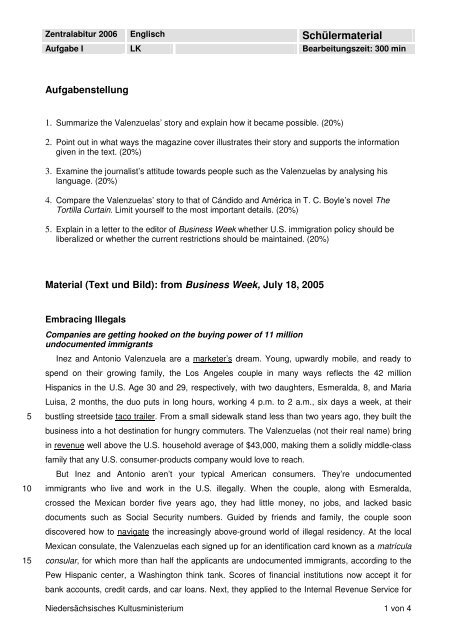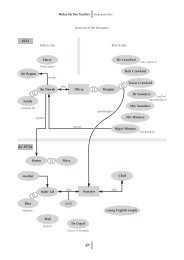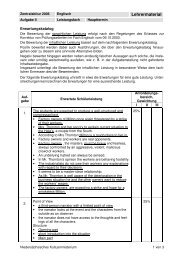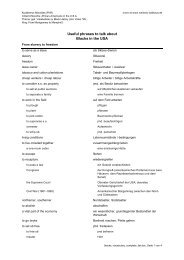Schülermaterial - schule.bbs-haarentor.de www2.bbs-haarentor.de
Schülermaterial - schule.bbs-haarentor.de www2.bbs-haarentor.de
Schülermaterial - schule.bbs-haarentor.de www2.bbs-haarentor.de
Create successful ePaper yourself
Turn your PDF publications into a flip-book with our unique Google optimized e-Paper software.
Zentralabitur 2006 Englisch Schülermaterial<br />
Aufgabe I LK Bearbeitungszeit: 300 min<br />
Aufgabenstellung<br />
1. Summarize the Valenzuelas’ story and explain how it became possible. (20%)<br />
2. Point out in what ways the magazine cover illustrates their story and supports the information<br />
given in the text. (20%)<br />
3. Examine the journalist’s attitu<strong>de</strong> towards people such as the Valenzuelas by analysing his<br />
language. (20%)<br />
4. Compare the Valenzuelas’ story to that of Cándido and América in T. C. Boyle’s novel The<br />
Tortilla Curtain. Limit yourself to the most important <strong>de</strong>tails. (20%)<br />
5. Explain in a letter to the editor of Business Week whether U.S. immigration policy should be<br />
liberalized or whether the current restrictions should be maintained. (20%)<br />
Material (Text und Bild): from Business Week, July 18, 2005<br />
5<br />
10<br />
15<br />
Embracing Illegals<br />
Companies are getting hooked on the buying power of 11 million<br />
undocumented immigrants<br />
Inez and Antonio Valenzuela are a marketer’s dream. Young, upwardly mobile, and ready to<br />
spend on their growing family, the Los Angeles couple in many ways reflects the 42 million<br />
Hispanics in the U.S. Age 30 and 29, respectively, with two daughters, Esmeralda, 8, and Maria<br />
Luisa, 2 months, the duo puts in long hours, working 4 p.m. to 2 a.m., six days a week, at their<br />
bustling streetsi<strong>de</strong> taco trailer. From a small si<strong>de</strong>walk stand less than two years ago, they built the<br />
business into a hot <strong>de</strong>stination for hungry commuters. The Valenzuelas (not their real name) bring<br />
in revenue well above the U.S. household average of $43,000, making them a solidly middle-class<br />
family that any U.S. consumer-products company would love to reach.<br />
But Inez and Antonio aren’t your typical American consumers. They’re undocumented<br />
immigrants who live and work in the U.S. illegally. When the couple, along with Esmeralda,<br />
crossed the Mexican bor<strong>de</strong>r five years ago, they had little money, no jobs, and lacked basic<br />
documents such as Social Security numbers. Gui<strong>de</strong>d by friends and family, the couple soon<br />
discovered how to navigate the increasingly above-ground world of illegal resi<strong>de</strong>ncy. At the local<br />
Mexican consulate, the Valenzuelas each signed up for an i<strong>de</strong>ntification card known as a matrícula<br />
consular, for which more than half the applicants are undocumented immigrants, according to the<br />
Pew Hispanic center, a Washington think tank. Scores of financial institutions now accept it for<br />
bank accounts, credit cards, and car loans. Next, they applied to the Internal Revenue Service for<br />
Nie<strong>de</strong>rsächsisches Kultusministerium 1 von 4
Zentralabitur 2006 Englisch Schülermaterial<br />
Aufgabe I LK Bearbeitungszeit: 300 min<br />
20<br />
25<br />
30<br />
35<br />
40<br />
45<br />
individual tax i<strong>de</strong>ntification numbers (ITINs), allowing them to pay taxes like any U.S. citizen – and<br />
thereby to eventually get a home mortgage.<br />
Today, companies large and small eagerly cater to the Valenzuelas – regardless of their status.<br />
In 2003 they paid $11,000 for a used Ford Motor Co. van plus $70,000 more for a gleaming new<br />
30-foot trailer that now serves as headquarters and kitchen for their restaurant. A local car <strong>de</strong>aler<br />
gave them a loan for the van based only on Antonio’s matrícula card and his Mexican driver’s<br />
license. Verizon Communications Inc. also accepted his matrícula when he signed up for cellphone<br />
service. So did a Wells Fargo & Co. branch in the predominantly Hispanic neighborhood in<br />
northeast Los Angeles where they live. Having a bank account allows them to pay bills by check<br />
and build up their savings. Their goal: to tra<strong>de</strong> up from a one-bedroom rental to their own home.<br />
Eventually, they also hope to expand their business by buying several more trailers. Matrícula<br />
hol<strong>de</strong>rs like the Valenzuelas are “bringing us all the money that has been un<strong>de</strong>r the mattress”, says<br />
Wells Fargo branch manager Steven Contreraz.<br />
Growth Engine<br />
(…)<br />
The corporate Establishment’s new hunger for the undocumenteds’ business could have farreaching<br />
implications for America’s stance on immigration policy, which remains unresolved.<br />
Corporations are helping, essentially, to bring a huge chunk of the un<strong>de</strong>rground economy into the<br />
mainstream. By finding ways to treat illegals like any other consumers, companies are in effect<br />
legalizing – and legitimizing – millions of people who technically have no right to be in the U.S. It’s<br />
even happening in mirror image, with some Mexican companies setting up programs to follow<br />
customers who move to the U.S. All this knits the U.S. and Mexico closer together, further blurring<br />
the bor<strong>de</strong>r and population distinctions.<br />
The economic impact could be significant. While most analysts peg the number of illegal<br />
immigrants at 10 million to 11 million, a recent study by Bear Stearns Asset Management<br />
conclu<strong>de</strong>d that data on housing permits, school enrollment, and foreign remittances suggests there<br />
could be as many as 20 million. Either way, experts agree that the undocumented, a majority of<br />
whom are Hispanic, are one of the nation’s largest sources of population growth. They add<br />
700,000 new consumers to the economy every year, more even than the 600,000 or so legal<br />
immigrants, according to Pew’s new study. What’s more, 84% of illegals are 18-to-44-year-olds, in<br />
their prime spending years, vs. 60% of legal resi<strong>de</strong>nts.<br />
from: Business Week, July 18, 2005, pp. 43/44.<br />
Nie<strong>de</strong>rsächsisches Kultusministerium 2 von 4
Zentralabitur 2006 Englisch Schülermaterial<br />
Aufgabe I LK Bearbeitungszeit: 300 min<br />
Annotations:<br />
(1) marketer – s.o. who sells goods or services<br />
(5) taco trailer – cheap mobile restaurant selling Mexican food<br />
(7) revenue – income<br />
(13) to navigate – to find one’s way; to un<strong>de</strong>rstand or <strong>de</strong>al with something complicated<br />
(19) home mortgage – a legal arrangement in which you borrow money from a bank in or<strong>de</strong>r to<br />
buy a house<br />
(27) to tra<strong>de</strong> up – to replace sth. you have with sth. better<br />
(34) stance on – attitu<strong>de</strong> towards<br />
(41) to peg – to set sth. at a particular level<br />
(43) remittance – a sum of money that is sent to sb. (Geldüberweisung)<br />
Nie<strong>de</strong>rsächsisches Kultusministerium 3 von 4
Zentralabitur 2006 Englisch Schülermaterial<br />
Aufgabe I LK Bearbeitungszeit: 300 min<br />
Cover of Business Week, July 18, 2005<br />
Hilfsmittel<br />
Den Prüflingen stehen einsprachige sowie für <strong>de</strong>n schulischen Gebrauch geeignete zweisprachige<br />
Wörterbücher <strong>de</strong>r Allgemeinsprache (<strong>de</strong>utsch-englisch/englisch-<strong>de</strong>utsch) zur Verfügung.<br />
Nie<strong>de</strong>rsächsisches Kultusministerium 4 von 4







